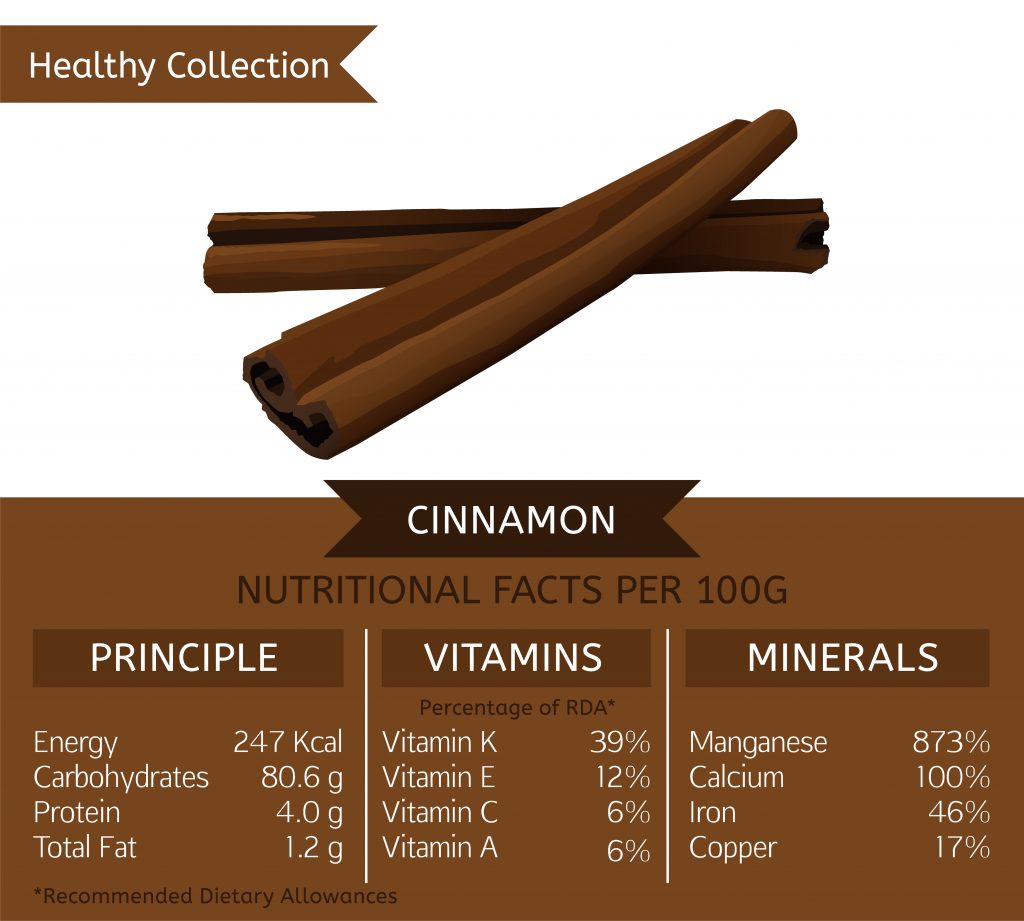What is Cinnamon?
Cinnamon is a spice that has been used for thousands of years and yet as popular as ever today. In fact, it is currently ranked as the number 1 spice out of the most common spices used in the world. Why is cinnamon enjoying such incredible popularity? This inexpensive spice can be found in every grocery store and it not only provides its characteristic taste of sweetness and warmth when added to recipes, but as many ancient cultures who have used it medicinally have known, cinnamon has many health benefits as well.
What’s Good About Cinnamon?

Cinnamon’s numerous healing and medicinal properties are well established. Here are just of few the benefits of this ubiquitous spice.
Cinnamon is loaded with antioxidants that reduce free radicals, fight oxidative stress, and limit nitric acid build up, all of which can help prevent various brain and heart diseases as well as cancer, and generally help slow the aging process. Cinnamon is ranked number 7 among all foods for its level of antioxidants.
Cinnamon can boost heart health by reducing high cholesterol, triglycerides, and blood pressure, all of which can help avoid strokes and heart disease. Further, its natural anticoagulant properties help it form blood clots that can stop excess bleeding and improve tissue repair and circulation in the body.
Cinnamon’s flavonoids help relieve inflammation, which can ease muscle soreness, swelling, menstrual pain, and allergic reactions. It can also preserve brain function and reduce the risk of cognitive decline. More research is needed, but it may help protect against neurological conditions such as Alzheimer’s and Parkinson’s disease.
Cinnamon can help stabilize blood sugar due to its anti-diabetic effects, while also improving insulin sensitivity for improved movement of sugar through the blood and into tissues. Supplementing with cinnamon extract may assist people with Type 2 diabetes.
Varieties
Cinnamon is produced from the bark of the Cinnamomum tree and is harvested by extracting its inner bark which dries into rolls that can be ground into cinnamon power. While most people would likely be surprised to learn that there are hundreds of types of cinnamon, most of the varieties used commercially can be classified as one of two types: Cassia cinnamon, with a flavor that is somewhat deeper and spicier, and Ceylon cinnamon with a bit of a lighter, sweeter, more citrusy taste. When most people think of “cinnamon,” they are thinking of the more commonly available Cassia variety, while the Ceylon variety is harder to find and more expensive.
Identifying and Buying Types of Cinnamon
Cassia cinnamon is readily available in the spice section of most grocery stores and supermarkets; however, you may need to look for Ceylon cinnamon in health or ethnic food stores, or in those sections of your grocery store. Cassia cinnamon is generally a red or dark brown in color while Ceylon cinnamon is a tan color. If the variety of cinnamon you are buying isn’t listed on the label, it is likely the more common Cassia variety.
Too Much of the Spice?
All varieties of cinnamon contain coumarin, a chemical that is present in plants and acts as a natural blood thinner. However, the concentration of coumarin is higher in Cassia cinnamon than in Ceylon cinnamon, an important distinction because coumarin has the potential to damage the liver if eaten in high enough quantities. This is something to keep in mind if you are if you are taking medications for or have a damaged liver, are about to undergo a dental or surgical procedure, or are at high risk of bleeding. Therefore, consuming too much Cassia cinnamon per day could be problematic for the liver. If you consume cinnamon daily for health reasons, you may want to consider exclusively eating Ceylon cinnamon. So even with cinnamon, there can be “too much of a good thing” as the adage goes, even for people without these health considerations, but the average person does need to be overly concerned with the effects of excess coumarin in their diet.
In summary
Cinnamon is a very popular spice that has been used for thousands of years for its sweet, warm flavor and its health and medicinal properties. Some of its many benefits are that it is loaded with antioxidants and can boost heart health, relieve inflammation, preserve brain function, and stabilize blood sugar. The two main varieties of cinnamon are Cassia, the less expensive and more commonly available variety with a deeper, spicier taste, and Ceylon, the more expensive and less common variety with a sweeter, more citrusy flavor. Coumarin is a natural blood thinner that is present in Cassia cinnamon in higher concentrations. People who are sensitive to liver issues or bleeding may want to consider switching to Ceylon cinnamon.
SOURCES USED:
paleofoundation.com/9-important-things-you-need-to-know-about-your-cinnamon/
draxe.com/nutrition/health-benefits-cinnamon/
Dr. Casey Sinclair, D.C. is a leading holistic healthcare doctor trained in functional medicine. He has extended his reach around the world by co-founding Family Health Advocacy, a health advocacy group lead by doctors and health professionals providing resources and education on global health matters. He has been fortunate to act as health a consultant to some of the largest companies in North America and as a professional speaker he’s had the privilege of speaking to thousands of people. Dr. Casey is an advocate for people suffering with chronic pain and fibromyalgia and has authored a book on the subject.
